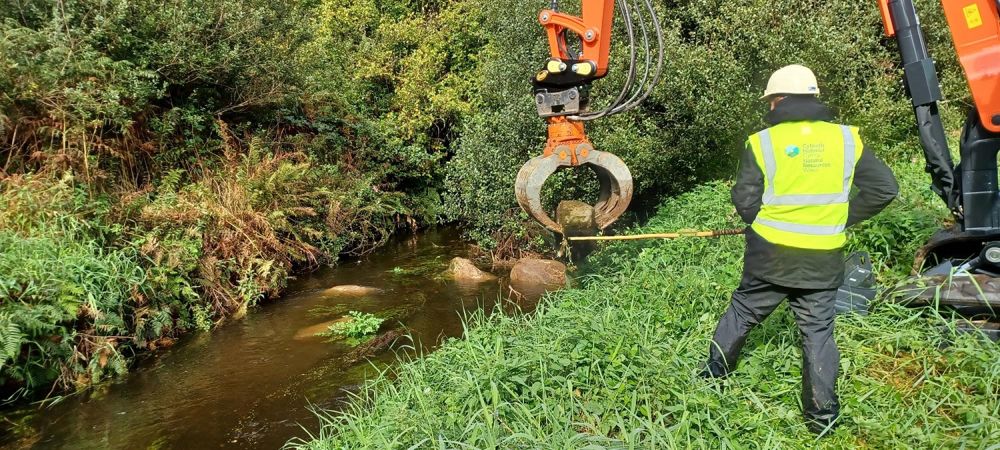Cleddau River benefits from two river habitat restoration projects

A restoration project with ambitions to make a Pembrokeshire river more resilient to the challenges of the climate and nature emergencies is making great strides.
The Natural Resources Wales’ (NRW) Four Rivers for LIFE project team began work to restore the Western Cleddau River in Pembrokeshire in October 2023, with the goal of creating valuable habitat for important fish and wildlife.
The Western Cleddau is designated a Special Area of Conservation (SAC) and has been heavily modified in the past. Dredging and straightening of some parts of the river has significantly affected the condition and health of the river habitat.
The first project saw the introduction of several pieces of large wood into the river to mimic the natural processes that happen when trees fall into rivers.
Introducing wood narrows the river channel and forces the water around the wood causing localised erosion and creating new meanders.
As material from the erosion deposits in the flow shadow of the wood over time, new gravel, sand and silt bars will be created which will, in turn, create vital habitat and areas for important fish such as lamprey and trout to spawn and raise their young.
The wood also provides shelter for fish from fast flows, shade and cooler water, and cover from predators.
Nathan Walton, Reserves Manager West and Wildlife Trust Officer for Pembrokeshire said: “The installation of a number of woody structures in the river is working well. The root plates are helping to slow water flow and encourage the natural re-meandering of the watercourse.
“Water levels are much higher than before, and areas of the reserve are now becoming wetter. This enhances the open water and fen features of the reserve and the species dependent on them.
“We are extremely grateful to the project for recent works on the upper reaches of the western Cleddau that passes through Llangloffan Fen.”
Llangloffan Fen is a lowland wetland in the upper part of the Western Cleddau river SAC. The fen is a national nature reserve managed in parts by the Wildlife Trust of South and West Wales (WTSWW), Natural Resources Wales (NRW) and some private landowners.
The second project saw the re-introduction of large boulders into a stretch of the Western Cleddau River, near Letterston village.
The boulders are believed to have been removed from the river as part of historic dredging in the late 1960s. This was confirmed by the presence of similar types and sizes of boulders found nearby. These boulders showed clear signs of weathering and erosion as opposed to bank protection boulders, which are quarried and angular in shape.
Introducing the boulders will create more natural flow diversity, as water speeds up on either side of the boulder and slows down upstream and downstream.
These different flow types create perfect conditions for different insects which are part of the food chain that supports species like salmon and otters.
The calm water flows also offer rest areas for fish, as they move up and downstream and swim from boulder to boulder to save energy.
Duncan Dumbreck from the Four Rivers for LIFE project said: “Historic surveys of fish and aquatic insects have found a mix of trout, lamprey, bullhead and stickleback in this part of the river.
“This regenerated habitat will be vital to the survival of species like salmon, which are at risk of becoming extinct in some rivers in Wales.”
Habitat recovery is a very slow process and can take hundreds of years. This work will boost the recovery process by using methods that would naturally occur.
Both projects were funded by the Four Rivers for LIFE Project, an EU LIFE funded programme looking to restore freshwater habitats for rare and important species.
To keep up to date with our work you can follow us on as Facebook, X and Instagram or subscribe to our newsletter here
